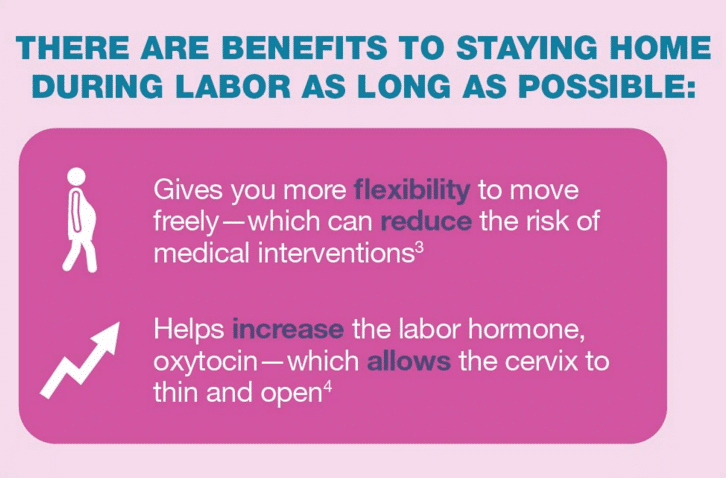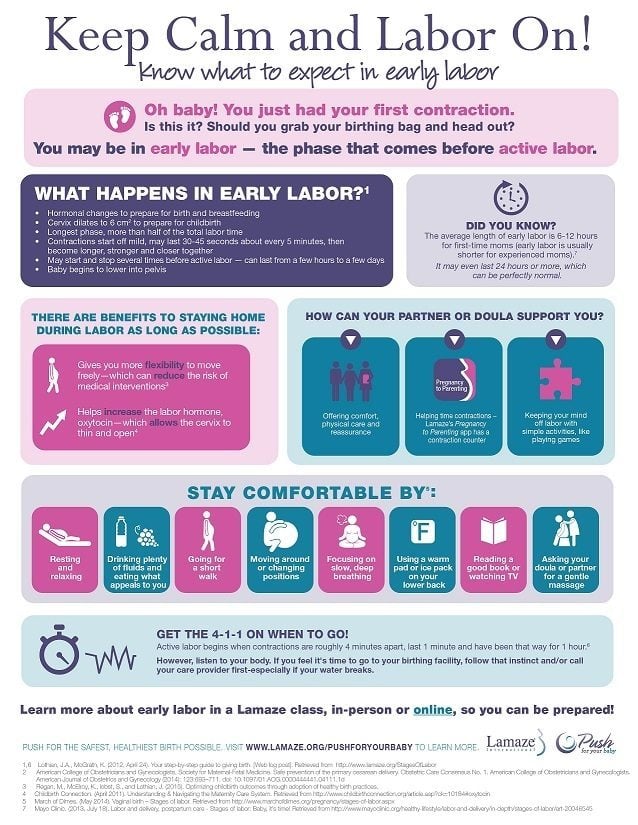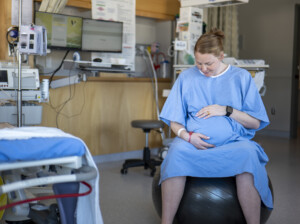Early labor. It’s the time when things start happening. You begin telling yourself, “Finally. This is it!” And, more than likely, you are ready to get started. You probably also have many other emotions — anxiety, nervousness, excitement, etc. Maybe you’re freaking out or feeling uncertain, relieved, or scared. Essentially, you’re feeling every emotion at once because you are ready to meet your baby. Still, you’re not sure what to expect from labor.
All these emotions are normal! But there are some things you should do during early labor to ensure you have a good labor and delivery. You are about to get on a crazy ride called labor, so buckle up! I’m going to walk you through what to do during this time.
What Is Early Labor?
If you went to a childbirth class, you learned that early labor is the longest and least intense stretch of labor.2 It’s when your cervix moves from the posterior (back) position to the anterior (front) position.4 The cervix begins to soften and efface (thin out) and is preparing to dilate (open).2,4 People determine you are in early labor by your dilation and contraction pattern. For dilation, early labor is when your cervix is 0–4 centimeters dilated.5
This is also why people typically recommend getting an epidural (at the very earliest) at 4 cm once you are in active labor.6 Those dull contractions you’ll feel will be shorter than a minute long and more than five minutes apart (from the start of one contraction to the beginning of the next). This will probably last for hours, potentially on and off for a day or so.7 For first-time mothers, the average length of early labor varies from hours to days. This time decreases with each child you have.2 But hopefully, you’re eating dates at the end of your pregnancy so that it won’t be as long for you.8 😉
What Does Early Labor Feel Like?
Typically, early labor can feel like a lower backache, aching in your lower tummy, cramps (like menstrual cramps or gas pain), or low-intensity contractions.9 Some women notice them immediately, and others don’t until further in labor. Both are normal!
6 Tips for What To Do in Early Labor
Since this is the longest part of labor, what do you do when you start recognizing early signs of labor? Follow these tips to help you:
1. Rest and Relax as Much as Possible
Most women think when they start feeling contractions, they should go on a long walk or for a swim and do some laps to pick up the pace and speed up labor. I am here to tell you it isn’t that beneficial or a good idea. These activities won’t speed up your labor and instead waste your energy on the easiest part of labor.12
Have you ever heard of a marathon runner starting a race with a sprint? Absolutely not. If they did, they wouldn’t finish the race because they would burn out their energy. They have a long way to go, and so do you! You would be burning all your energy and saving none of it for the most challenging part of labor, which is the end when you need to push.7 This is why it’s best to rest and relax as much as possible during early labor.11 Save and reserve as much stamina for the challenging part!
Avoid getting in the tub or a pool during early labor because it will work against you. The weightlessness works against gravity and can slow down or stall your labor. This is why waiting until you’re 7 cm dilated (the “transition” stage) to get in the water is wise.18 I recommend using the shower instead if you want to use water for pain relief before reaching transition labor. If you’re craving to get in the tub before transition, stay there for, at most, 30 minutes at a time. Submerging yourself in the water before you’re 7 cm can cause your labor to slow down.18
If your labor begins at night, try to go back to sleep. I know it’s easier said than done since you are excited and ready to have your baby. But remember, there is a long road ahead, and you must rest to prepare for what’s to come.
2. Distract Yourself
In between getting some sleep and rest, try to keep yourself distracted. Keep your mind off what’s happening inside you and focus on other things to help pass the time. Some options are:
- Watching a movie
- Writing in your pregnancy journal
- Getting your baby book ready
- Baking cookies for your nurses at the hospital (your nurses in labor and delivery will love the thoughtful gift, and it might even win them over, making them more accommodating to your wants and needs)
- Getting a massage
- Getting your nails done
- Going out to eat and having your last meal as a family of two (or more if you have other children)
- Preparing some snacks for you to nibble on throughout labor
- Making some padsicles and having them ready in your freezer for recovery
- Going on a relaxing walk around the neighborhood
You name it! Maybe you even have some last-minute projects you can get done. Do them! Anything that will take your mind off things for a while is incredibly beneficial in early labor. This way, you won’t be focusing so much on the clock. Just rest and relax between your projects to conserve your energy.
3. Keep Nourished and Hydrated
Studies show that staying hydrated and eating light snacks during early labor can reduce labor’s total length by as much as 90 minutes.1 Awesome, right?! This is why you want to drink enough water (or see our labor-aide recipe) during early labor and labor in general to avoid dehydration.16 Dehydration can cause you to have ineffective contractions.17
You should also eat foods during early labor that will give you lasting energy. Carbs are an excellent choice.13 If eating carbs feel too heavy at that time, try having a smoothie, some fruit, granola, or a protein bar. Just know that whatever foods you eat in early labor, you may see again during active labor or transition since throwing up in labor is common.14 This is why I don’t recommend anything fried or greasy. You should also avoid spicy food during early labor since it can cause diarrhea during labor, which is no fun!15
4. Stay at Home for as Long as Possible
Because of what’s shown in the movies and what society has told us, you may think you have to rush to the hospital as soon as your water breaks or if you start feeling regular contractions. This is not true!20 (Unless there is meconium in your water, you have an infection, or your baby’s cord is coming out — cord prolapse.)21 You can take your time heading to the hospital until you feel that labor has reached active labor.20
If you are concerned, don’t feel safe, or cannot cope at home for much longer, that’s when you should go to the hospital in labor. Otherwise, staying home as long as you can is the best option because it gives you a better chance of having a shorter and more positive experience.20
Why is that? Your body is familiar with your surroundings and knows you and your baby are safe in your home. The hospital is a foreign setting with new sights and smells, and your body can begin to slow down if you arrive there too early in labor.20

Another benefit of staying at home as long as possible is keeping you off the hospital’s clock. The earlier you arrive, the more likely the hospital staff will introduce interventions. What does that mean? When you check into the hospital, the staff records your progress and monitors you to ensure you are progressing enough to their standards. They typically want you to dilate 1 cm an hour.2 If you are not progressing as they would like, they will start recommending interventions — such as breaking your water, giving you Pitocin, or even doing a C-section.
It can take a while to give birth to a baby, and the last thing you need is to feel pressured! If your medical team makes you feel stressed in your vulnerable state, you may start doubting your body or ability to birth well. This can cause women to ask for or accept forms of induction to get it over with. The only problem is that it significantly increases your chances of having an emergency C-section.23 For first-time mothers, getting induced doubles your chances of needing an emergency C-section.3 This is mainly because induced labor is stronger and more intense than natural contractions.22
Even with an epidural to relieve the pain, your baby still feels the effects of the more intense contractions. This can cause your baby’s heart rate to plummet since the harder and faster contractions compress their blood and oxygen supply. This usually ends in an emergency C-section.24 Then, sadly, mothers think their bodies have failed them and can’t dilate and give birth to a baby. This couldn’t be further from the truth, so relaxing and staying at home for as long as possible is essential!
5. Have Your Bags Packed and Ready To Go
Hopefully, you will already have your hospital bags packed and ready. If not, once you recognize that things are beginning to happen, it’s an excellent time to ensure you have everything prepared by the door or even in the car.
6. Don’t Feel Disappointed or Discouraged!
Don’t feel discouraged if your labor lasts longer than you hoped. Again, early labor is the most extended phase, not a sign of what will come.2 Anxiety or stress can slow or stall your labor, and that’s the last thing you want.10
Labor is like running a marathon. You need to prepare in advance and pace yourself early on. Also, have calories and fluids to keep up your energy.19 You may want to be alone and zone out from ordinary life, or you may need someone to encourage you. It could be a doula, a friend who has had a positive birth experience, or your partner.
Above all, listen to your body. Experiment with positions during early labor that you find comfortable and do what feels right, whether getting rest or moving around. Things will eventually pick up, and if you follow these tips, you will be ready for what’s to come. You’ve got this!
























